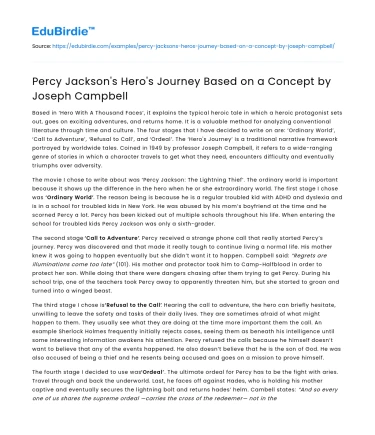Based in ‘Hero With A Thousand Faces’, it explains the typical heroic tale in which a heroic protagonist sets out, goes on exciting adventures, and returns home. It is a valuable method for analyzing conventional literature through time and culture. The four stages that I have decided to write on are: ‘Ordinary World’, ‘Call to Adventure’, ‘Refusal to Call’, and ‘Ordeal’. The ‘Hero's Journey’ is a traditional narrative framework portrayed by worldwide tales. Coined in 1949 by professor Joseph Campbell, it refers to a wide-ranging genre of stories in which a character travels to get what they need, encounters difficulty and eventually triumphs over adversity.
The movie I chose to write about was ‘Percy Jackson: The Lightning Thief’. The ordinary world is important because it shows up the difference in the hero when he or she extraordinary world. The first stage I chose was ‘Ordinary World’. The reason being is because he is a regular troubled kid with ADHD and dyslexia and is in a school for troubled kids in New York. He was abused by his mom’s boyfriend at the time and he scorned Percy a lot. Percy has been kicked out of multiple schools throughout his life. When entering the school for troubled kids Percy Jackson was only a sixth-grader.
Save your time!
We can take care of your essay
- Proper editing and formatting
- Free revision, title page, and bibliography
- Flexible prices and money-back guarantee
The second stage ‘Call to Adventure’. Percy received a strange phone call that really started Percy’s journey. Percy was discovered and that made it really tough to continue living a normal life. His mother knew it was going to happen eventually but she didn’t want it to happen. Campbell said: “Regrets are illuminations come too late” (101). His mother and protector took him to Camp-Halfblood in order to protect her son. While doing that there were dangers chasing after them trying to get Percy. During his school trip, one of the teachers took Percy away to apparently threaten him, but she started to groan and turned into a winged beast.
The third stage I chose is ‘Refusal to the Call’. Hearing the call to adventure, the hero can briefly hesitate, unwilling to leave the safety and tasks of their daily lives. They are sometimes afraid of what might happen to them. They usually see what they are doing at the time more important them the call. An example Sherlock Holmes frequently initially rejects cases, seeing them as beneath his intelligence until some interesting information awakens his attention. Percy refused the calls because he himself doesn’t want to believe that any of the events happened. He also doesn’t believe that he is the son of God. He was also accused of being a thief and he resents being accused and goes on a mission to prove himself.
The fourth stage I decided to use was ‘Ordeal’. The ultimate ordeal for Percy has to be the fight with aries. Travel through and back the underworld. Last, he faces off against Hades, who is holding his mother captive and eventually secures the lightning bolt and returns hades’ helm. Cambell states: “And so every one of us shares the supreme ordeal —carries the cross of the redeemer— not in the bright moments of his tribe's great victories, but in the silence of his personal despair”. The hero stands in the inmost cave's deepest chamber and faces a direct confrontation with his biggest fear. Whatever the hero came for, it's Death that stares back at her now. She is put to death in a battle with a hostile force.
In conclusion. on their own, story structures aren't particularly potent or useful. For example, just stringing a series of various plot points together making sure it is in the correct order has little inherent value. However, where storytelling becomes incredibly powerful, is when it connects to us on a deeper, more basic level. Fortunately, Hero's Journey has built-in mechanisms to create those kinds of connections. Essentially it draws upon our innate human ability to become better versions of ourselves. It gives us a sense that change can be true and meaningful. This tells us we can get better, conquer our internal and external challenges and win the day. And, as an added bonus, the different archetypes and concepts of character and the journey's inner challenges can be interpreted and experienced through cultures. It is a universally accessible form of storytelling because it ties in so many fundamental aspects of what it means to be human.






 Stuck on your essay?
Stuck on your essay?

